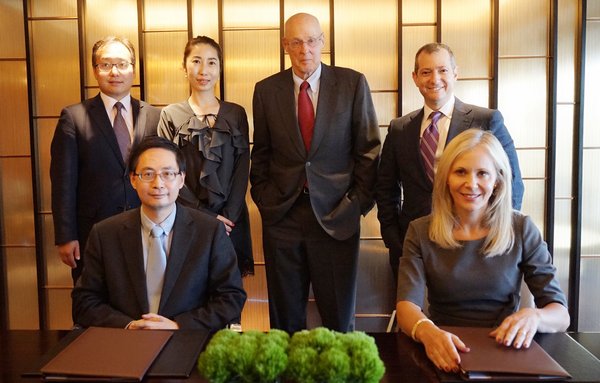BEIJING, Oct. 17, 2018 /PRNewswire/ --On October 16th, the Paulson Institute's Green Finance Center signed a strategic cooperation agreement with the Center for Finance and Development at the Tsinghua University National Institute of Financial Research (Tsinghua Center for Finance and Development). The agreement reflects both organizations' commitment to support the development of a robust green finance market in China, to facilitate China's transition to a low-carbon economy, and to reinforce the role of green finance in advancing the global sustainable development agenda.

Green finance plays a significant role in supporting green and sustainable development globally. As China implements its bold green finance plan, the example could serve as a catalyst for other countries. Collaboratively, the two leading think tanks in U.S. and China will provide thought-leadership, advance meaningful dialogues, influence policymaking and elevate capacity building to support the development of a robust green finance market in China and beyond.
Deborah Lehr, Vice Chairman of Paulson Institute said: "China has made green finance a top priority and the impact of this effort is starting to be seen in China's transition to a low carbon economy. The Paulson Institute is pleased to be partnering with The Tsinghua Center for Finance and Development to explore innovative measures for using market mechanisms and transparent, high quality standards to promote green development in China and abroad."
Ma Jun, Director of Tsinghua Center for Finance and Development, who is co-chair of G20 Sustainable Finance Study Group, said that "The G20 has successfully mainstreamed the concept of green finance among global leaders, and demand for green financial research and capacity building is now growing exponentially. Tsinghua Center for Finance and Development and the Paulson Institute' Green Finance Center are in an unique position to mobilize expertise and resources from China and the US to help advance the green finance agenda globally."
The agreement between the two leading think tanks prioritized four areas of focus to help advance China's transition to a low-carbon economy, including:
This partnership is built upon previous successful collaborations between the two organizations. In the past two years, the Paulson Institute's Green Finance Center and the Tsinghua Center for Finance and Development have brought together policy makers and specialists to convene high level roundtable discussions on the development of China's national carbon market, application of fintech for sustainable development and various other topics.
About the Paulson Institute's Green Finance Center
The Paulson Institute is a non-partisan, non-profit "think and do" tank founded by Henry M. Paulson, Jr., the 74th Secretary of the Treasury and former Chief Executive Officer of Goldman Sachs. Our mission is to strengthen U.S.-China relations and to advance sustainable economic growth and environmental protection in both countries. The Paulson Institute's Green Finance Center has been created to emphasize the growing importance of green finance in supporting green and sustainable development globally. The Center's current efforts includes supporting the work of the G20 Sustainable Finance Study Group, facilitating the utilization of U.S. green technologies in support of China's green development, supporting China's national carbon market goals, promoting green investment and utilizing fintech for sustainable development.
About the Tsinghua Center for Finance and Development
Center for Finance and Development of Tsinghua University National Institute of Financial Research (Tsinghua Center for Finance and Development) is dedicated to studying practical issues related to macro-economy and finance and to providing recommendations for economic and financial policy makers. The Center aims to become an important think tank and will play an active role in international dialogues on economic and financial issues. In addition to long-term themes, the Center also works with government agencies, regulators and financial institutions on research projects and supports the work of the People's Bank of China.